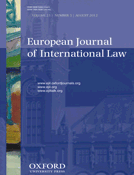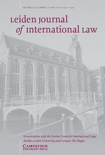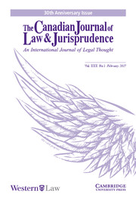
European Journal of International Law
Scope & Guideline
Advancing the discourse on global legal frameworks.
Introduction
Aims and Scopes
- International Legal Theory and Philosophy:
EJIL explores foundational questions of international law, including its ethical, philosophical, and theoretical underpinnings. This encompasses debates on legal positivism, natural law, and the implications of international law on global governance. - Human Rights and International Humanitarian Law:
The journal consistently addresses issues related to human rights law, humanitarian law, and the intersection of these fields with current global challenges, such as armed conflicts, refugee crises, and state sovereignty. - Environmental Law and Global Governance:
EJIL publishes works that examine the legal frameworks governing environmental protection, climate change, and sustainable development, reflecting the increasing importance of these issues in international law. - Trade and Investment Law:
The journal features analyses of international trade law, investment treaties, and the legal dynamics of globalization, including the role of corporations and states in shaping legal norms. - Regional Studies and Global Perspectives:
EJIL emphasizes the significance of regional legal practices and their contributions to global legal discourse, often highlighting case studies from various jurisdictions. - Interdisciplinary Approaches:
The journal encourages interdisciplinary scholarship that integrates insights from political science, sociology, and economics to enrich the understanding of international legal phenomena.
Trending and Emerging
- Climate Change and Environmental Justice:
Recent publications emphasize the intersection of climate change, environmental law, and human rights, highlighting the legal implications of environmental degradation and the quest for justice in a changing climate. - Digital Governance and Cyber Law:
The rise of digital technologies has led to increased scrutiny of international law in cyberspace, including issues related to data privacy, cybersecurity, and the regulation of digital platforms. - Gender and International Law:
There is a growing focus on gender issues within international law, including gender-based violence, women's rights, and the role of gender in legal frameworks, reflecting broader societal movements. - Postcolonial Perspectives and Critical Legal Studies:
Scholarly interest in postcolonial critiques of international law is rising, examining how historical injustices continue to shape contemporary legal practices and discourses. - Global Health Law and Pandemic Response:
In light of recent global health crises, the journal has featured discussions on the legal frameworks governing public health, international cooperation, and responses to pandemics. - Transnational Legal Processes:
EJIL has increasingly published works that explore transnational legal processes, addressing how laws and norms traverse borders and influence global governance.
Declining or Waning
- Traditional State Sovereignty Debates:
Discussions centered around the rigid concepts of state sovereignty and non-intervention have decreased, as scholars increasingly engage with more fluid notions of governance and global interdependence. - Historical Analyses of International Law:
There has been a noticeable decline in papers solely focused on historical perspectives of international law, likely overshadowed by contemporary issues that demand immediate scholarly attention. - Theoretical Foundations of International Law:
While theoretical explorations remain important, there appears to be a waning interest in abstract theoretical debates, with scholars favoring practical implications and case studies instead. - Regional Legal Frameworks in Isolation:
Research focusing on regional legal frameworks without a global context or comparative analysis has diminished as the journal promotes more interconnected discussions. - Conventional Approaches to International Dispute Resolution:
The journal has seen fewer contributions that adhere strictly to traditional mechanisms of dispute resolution, as emerging methods and alternative dispute resolution mechanisms gain traction.
Similar Journals

Journal of International and Comparative Law
Illuminating the Intersection of Law and PracticeThe Journal of International and Comparative Law is a premier academic publication dedicated to advancing knowledge and sparking critical discourse in the field of law. Published by SWEET & MAXWELL, this journal aims to bridge the gap between international legal standards and comparative practices, making it an essential resource for legal scholars, practitioners, and students alike. With an impact factor that positions it in the Q3 category of legal journals and a Scopus rank of #534 out of 1025 in the Social Sciences - Law category, it is recognized for its contribution to the legal community since its inception in 2018. The journal, based in Hong Kong, seeks to publish high-quality, peer-reviewed articles that reflect a diverse range of legal perspectives and methodologies. Although the journal is not open access, it remains committed to disseminating vital research and case studies that shape contemporary legal paradigms. Scholars and legal professionals can stay informed on authoritative insights by engaging with this important resource until 2024 and beyond.

Canadian Yearbook of International Law
Bridging Knowledge Gaps in Global JurisprudenceCanadian Yearbook of International Law, published by Cambridge University Press, serves as a vital platform for scholarly discourse within the realms of law and international relations. With a rich history dating back to 1989, the journal engages a diverse audience of researchers, academics, and practitioners by offering insightful analyses of contemporary legal issues and policy debates. Although the journal currently holds a Q4 quartile ranking in both the law and political science categories, it remains an essential resource for understanding the evolving landscape of international law. Despite the current limitations in access options, the journal's rigorous peer-review process ensures that each publication maintains high academic standards, encouraging thoughtful discussions that contribute to both theoretical and applied aspects of international law. The Canadian Yearbook helps bridge gaps in knowledge and fosters greater understanding among scholars worldwide, enhancing its significance in the academic community.

CORNELL INTERNATIONAL LAW JOURNAL
Advancing global legal scholarship for a just world.CORNELL INTERNATIONAL LAW JOURNAL, published by CORNELL LAW SCHOOL, is a premier academic journal dedicated to advancing scholarship in the fields of law, political science, and international relations. Established with a commitment to fostering critical dialogue, this journal provides a platform for innovative research and legal analysis on pressing global issues. With an ISSN of 0010-8812 and an E-ISSN of 1930-7977, CORNELL INTERNATIONAL LAW JOURNAL holds a respectable Q3 ranking in the 2023 categories of Law, and Political Science and International Relations, underscoring its relevance within the academic community. The journal is indexed in Scopus, achieving a rank of #416 in Law and #345 in Political Science, illustrating its significant impact and accessibility. By providing essential insights, this journal aims to serve not only academics but also practitioners and policymakers interested in the evolving landscape of international law and governance.

Leiden Journal of International Law
Exploring the intersections of law and politics.Leiden Journal of International Law, published by Cambridge University Press, stands as a leading platform for scholarly discourse in the fields of international law and political science. With its ISSN 0922-1565 and E-ISSN 1478-9698, the journal has established a significant academic presence since its inception in 1988, upholding rigorous standards through a robust peer-review process. The journal is notable for its impressive impact factor, categorizing it in the Q1 quartile for law and Q2 for political science and international relations, indicating its widespread influence and recognition among scholars. As a vital resource for researchers and practitioners, the journal contributes to the advancement of legal scholarship and promotes critical discussions surrounding contemporary international issues. Although it operates under a traditional subscription model, its comprehensive analyses and critical insights make it an essential read for those engaged in the interdisciplinary examination of law and global governance. The journal is headquartered in Cambridge, England, and continues to play a pivotal role in shaping the discussions that define the contemporary landscape of international law.

Journal of East Asia and International Law
Innovating Legal Thought for a Changing International LandscapeThe Journal of East Asia and International Law, published by the YIJUN Institute of International Law, serves as a vital platform for scholarly discourse in the field of law, with a particular focus on the complexities of East Asian legal systems and their interactions within the global context. Established in 2011 and based in Seoul, South Korea, this journal has been pivotal in fostering research that examines legal issues impacting East Asia, making significant contributions to the understanding of international law in this dynamic region. With its ISSN 1976-9229, the journal provides a valuable resource for researchers, professionals, and students interested in the evolving legal landscapes of East Asia. Though currently categorized in the Q4 quartile for law in the Scopus rankings, its dedication to enhancing legal scholarship positions it as a relevant player among emerging international law journals, encouraging submissions that explore innovative legal approaches and analyses. As ongoing interdisciplinary discussions deepen, the Journal of East Asia and International Law aims to enrich the academic community's understanding of international legal frameworks within East Asian contexts.

International Organizations Law Review
Empowering Research at the Nexus of Law and Global AffairsInternational Organizations Law Review is a distinguished academic journal published by BRILL, focusing on the interdisciplinary intersections of law, political science, and economics in the context of international organizations. With an ISSN of 1572-3739 and an E-ISSN of 1572-3747, this journal has been a key player in advancing scholarly dialogue since its inception in 2004, and it is set to continue its vital contribution until 2024. Though currently categorized in the Q4 quartile across various domains, including Economics and Law, it holds a respectable position within Scopus rankings, indicating its growing influence in the social sciences. Researchers and professionals looking for critical insights and the latest research in international law and organizational dynamics will find this journal invaluable. The International Organizations Law Review is committed to fostering a deeper understanding of the legal frameworks governing international interactions, making it an essential resource for students and academics alike.

Juridical Tribune-Tribuna Juridica
Advancing Knowledge in Legal and Political DiscoursesWelcome to the Juridical Tribune-Tribuna Juridica, an esteemed journal dedicated to the interdisciplinary exploration of legal studies, political science, and public administration. Published by EDITURA ASE in Romania, this open-access journal has been a beacon of knowledge since its inception in 2011, making scholarly research accessible to a global audience. With a robust focus on contemporary issues in law and governance, the journal is categorized in the Q2 and Q3 quartiles across several fields, highlighting its significance in Education, Law, Political Science and International Relations, and Public Administration. Its impressive ranking, standing at the 71st percentile in Law and the 60th percentile in Political Science, showcases its contribution to advancing academic discourse. The journal spans a convergence of years from 2019 to 2024, reflecting its commitment to ongoing, relevant research. Scholars, practitioners, and students alike are invited to delve into the rich resources available through this journal, fostering insights and dialogue that are crucial in today's dynamic legal and political landscape.

Annual Review of Law and Social Science
Advancing Insights at the Intersection of Law and Social ScienceThe Annual Review of Law and Social Science, published by ANNUAL REVIEWS, is an essential interdisciplinary journal that bridges the domains of law, sociology, and political science. Established in 2006, this pivotal resource has consistently been recognized for its scholarly excellence, achieving a Q1 ranking in both the Law and Sociology and Political Science categories as of 2023. With a remarkable Scopus ranking that places it in the 93rd percentile among law journals, it serves as a vital platform for researchers and professionals seeking to engage with comprehensive reviews of contemporary issues at the intersection of these fields. Although not an open-access journal, its contributions are fundamental for advancing scholarship and fostering deeper insights into the relationship between social dynamics and legal frameworks. The journal's rigorous annual reviews provide valuable syntheses of the latest research, making it an indispensable resource for academics, policymakers, and students alike.

Canadian Journal of Law and Jurisprudence
Illuminating the Intersection of Law and PhilosophyCanadian Journal of Law and Jurisprudence, published by Cambridge University Press, serves as a pivotal platform in the field of legal studies, particularly recognized for its comprehensive exploration of jurisprudence in the context of Canadian law. While the journal operates without an open access model, its ISSN 0841-8209 and E-ISSN 2056-4260 ensure broad academic accessibility. Based in the United Kingdom, it has established a notable impact within its category, maintaining a Q3 ranking in Law according to the latest 2023 metrics. With its convergence of issues from 1996 to 2003, periods in 2007, and recently from 2012 to 2024, the journal embraces a rich historical context while addressing contemporary legal challenges. Ranked #439 out of 1025 in the social sciences category on Scopus, the journal is positioned within the 57th percentile, highlighting its significance and influence in legal scholarship. Aimed at researchers, professionals, and students, the Canadian Journal of Law and Jurisprudence is an essential resource for those seeking to deepen their understanding of the evolving landscape of law and its philosophical underpinnings.

Utrecht Journal of International and European Law
Elevating International and European Law DiscourseUtrecht Journal of International and European Law, published by UBIQUITY PRESS LTD, serves as a dynamic platform for the dissemination of scholarly research in the realms of international and European law. Since its inception as an open-access journal in 2013, it has provided unrestricted access to cutting-edge legal scholarship, fostering global dialogue among legal professionals, researchers, and students. With a notable Scopus rank of 249 out of 1,025 in the law category and a commendable Q3 rating, the journal emphasizes innovative legal theories and practices relevant to contemporary global challenges. Located in the heart of the United Kingdom, the Utrecht Journal is committed to maintaining high academic standards while also promoting the exchange of knowledge across borders, which is crucial given the ever-evolving landscape of international law. As it converges its focus from 2020 to 2024, the journal seeks to become an essential reference for those dedicated to the exploration and expansion of legal discourse in this vital field.